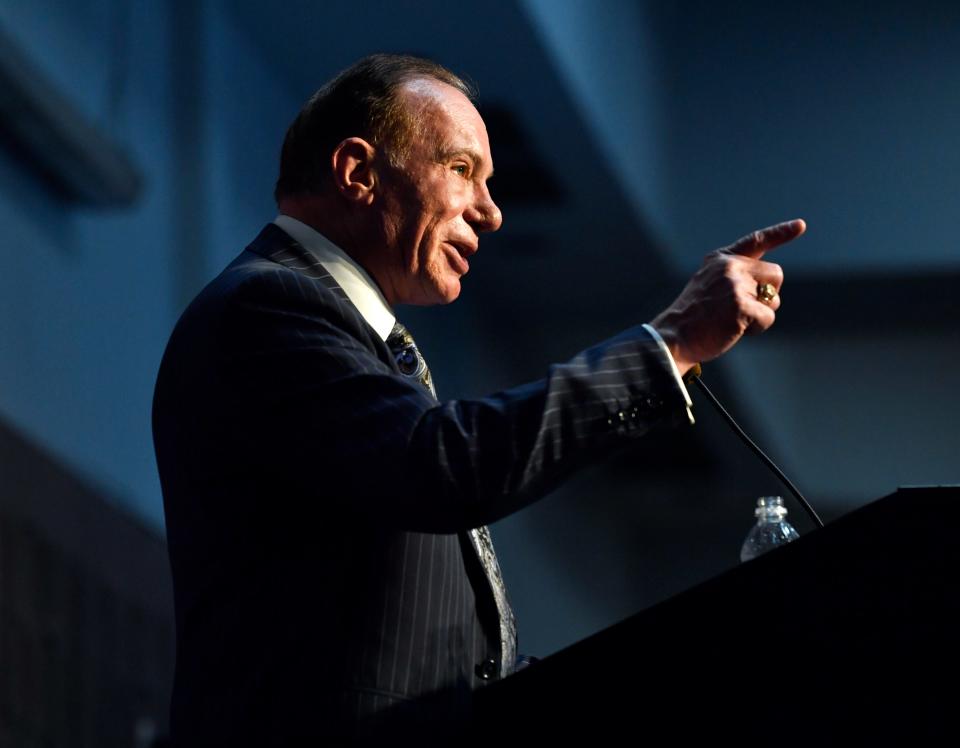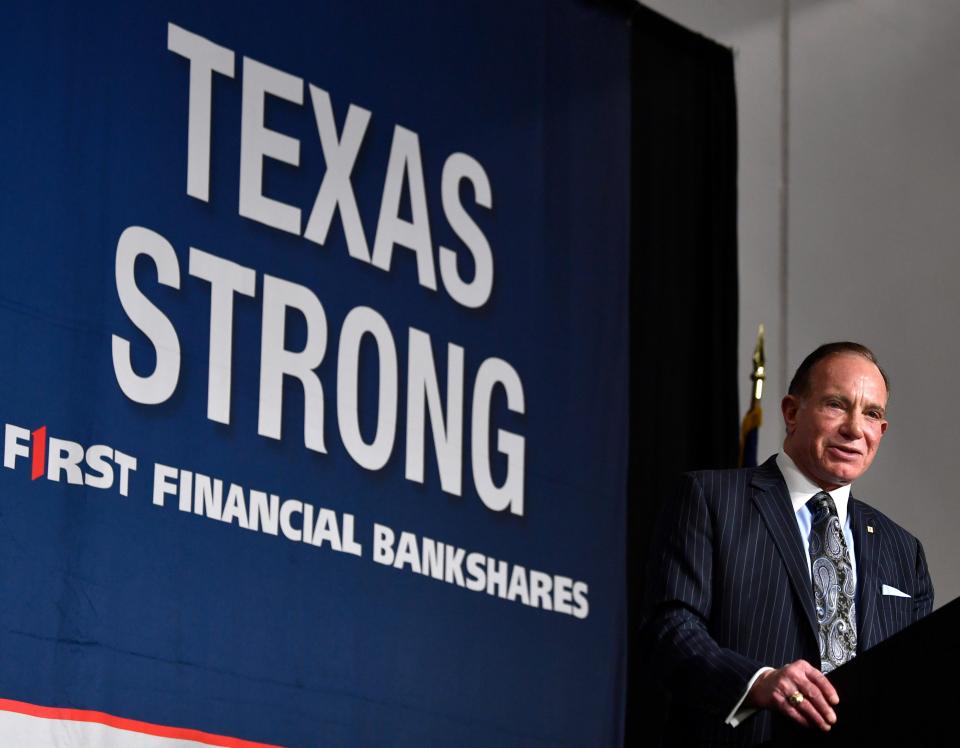Future focused: First Financial earnings off this quarter but bank poised for strong 2023
First Financial Bankshares Inc. on Thursday reported first-quarter income of $52.57 million, down from $55.97 million the same quarter in 2022.
However, Scott Dueser, the bank's chairman, president and CEO, was quick to point out the positives for the Abilene-based banking institution. This is in the face of uneasiness about the industry this quarter after two U.S. lenders failed and global concerns prompted regulators to step in.
But, Dueser said, a slow start to the year for his bank, which he said is on solid ground, is not unexpected in business.
"The first quarter is always slower," he said Thursday. "After you get through Christmas, things kind of slow down.
"Now, we're seeing that pick up."

This year, there was more affecting the banking world. First Financial, he said, was set up to weather the storms that have blown harder against other banks.
Two areas negatively affected First Financial, he said.
First was a decrease in debit card income, about $4 million, which was not unexpected. Dueser said this is the result of the July passage of the Durbin bill, which is intended to enhance competition and choice in the credit card network market. This goes back to 2008-09, when large retailers asked for help during the economic downturn.
They gained income and banks lost it.
"When you pass $10 billion, your debit card income gets cut in half," Dueser said. First Financial has grown past that benchmark; its latest report shows the bank at $13 billion, compared to $13.3 billion in March 2022.
He said it "was not a very good deal but it is what it is. We knew that was coming."
Secondly, mortgage income was down this quarter, almost $3 million.
"We don't have as many people buying houses because of the rates," he said. "But we're seeing that pick up. Spring buying is happening and we're seeing our pipeline there full."
On the upside, too, is that deposits did not fall off steeply at First Financial. That was not the case elsewhere.
"The face that we haven't had people pulling deposits is huge," Dueser said.
The pandemic filled banks that were able to attract PPP (Paycheck Protection Program) and government money, Dueser said.
Now, the government is not buying bonds and putting cash into the economy, he said.
"They are selling bonds and taking cash out of the economy. At the same time, the rate increases," he said.
The prime rate - the interest rate that banks use as a basis to set rates for loans, credit cards and lines of credit - is at 8% currently.
"To be flat or down a little in deposits is going to be huge," he said. "I could not be more pleased with that."
Net new accounts was more than 4,000 in the quarter - the most in the past year, Dueser said.
"People are continuing to bring their business to us," he said.
In a news release, Dueser called First Financial "safe, sound and secure." He repeated that in talking to the Reporter-News.
"No. 1, we've got great capital," Dueser said. He pointed to the bank's capital ratio numbers. "That's still extremely high."
If First National on a given day sold all of its bonds, it would take a $458 million loss, he said. That compares to $209 million a year ago.
"That's from interest rates going up, and when interest rates go up, you lose money in the bond portfolio," he said. "We're not planning on selling those bonds and taking that loss. We are selling bonds from time to time if we can break even on them."
The bank is down $1.2 billion in investment securities, he said. Part of that he attributes to maturities and to selling bonds at break-even.
"That portfolio is paying us 3 percent. Every dollar we can get out of that portfolio is moving into loans at a higher rate," he said. "That is how our earnings are going to continue to improve throughout the year as bonds flow out of that."
"We have $50 million a month that comes out of the bond portfolio that mature."
Loan growth is how earnings will grow the rest of 2023, he said.

"Loans are up right at $1 million," he said. That total is $6.58 billion, compared to $5.57 billion in March 2022.
"That is why I am encouraged by what is going on with us," Dueser said.
When rates rise as much and as quickly as they have, he said, "Man, it's hard to readjust. But we have a balance sheet that we can, and that's why we don't look like these other banks. They took some really big losses, and we don't have to do that."
Dueser said the bank's common equity is almost 19%. Common equity is the total of all investments from investors in a company. That includes common stock.
"That's huge for a bank," he said.
While First Financial is hardly a small banking operation, it's not one of nation's largest. That's an advantage, Dueser said.
"We're more nimble," he said. "We can manage our balance sheet. We have the liquidity if we need it. We can go in tomorrow and borrow $4 billion if we needed to. If we saw a compression in deposits. It's not cheap to do that."
And First Financial is not in that situation, he said. Some banks cannot make loans because they don't have the cash to do it, he said. They are "loaned up," he called it.
"We do" have the cash, Dueser said. "We can fund all these loans that are coming down the pipeline."
First Financial's pipeline for loans is full, he said, "and the next two quarters look very good for loan growth."
Oil and gas in Texas is doing well, and that means bigger bank deposits, Dueser said.
"Wind and oil and gas are two big things for us," he said. That includes First Financial Trust, "because we manage a lot of oil and gas properties. Eighteen percent of their income comes from managing oil and gas."
First Financial also manages the farms and ranches that have wind turbines, so that is another revenue stream.
"Green energy and oil and gas, the better they do, the better we do," Dueser said.
So, is now a good time to buy stock in First Financial? The price per share is currently is around $30.
Dueser laughed.
"I can't say that," he said. "But I think it's certainly underpriced today. We're the same bank we were when it was $45 a share."
The bank's annual meeting is Tuesday. Dueser said information will be shown about how favorably his bank compares to others in the S&P 500.
"They're down and we're down," he said. "But like I say, we can't control the market but we can control our earnings and we can control what we can do.
"We don't focus on stock price."
This article originally appeared on Abilene Reporter-News: First quarter report: First Financial earning off but bank poised for strong 2023
